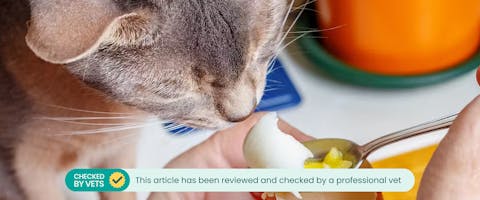Updated 10/05/2023
Eggs: they’re a regular staple when it comes to our weekend brunch order, sure - but can your feline friend enjoy them, too? The short answer is yes, cats can eat eggs. That said, they should only be fed in moderation - and absolutely, only when fully cooked.
Let’s delve a little deeper into the world of kitty egg consumption, and learn more about how this popular breakfast staple fits into your cat’s culinary repertoire.
Trending posts
Purr-use some of the top blogs our members have been loving this month- Top male dog names for your new furry friendGot a new furry family member in your pack? Check…

- Top female dog names for your new fluffy palWelcoming a new pooch into your family? Explore…

- 250+ gray cat names your silver feline will loveRecently welcomed a fluffy gray bundle of joy into…

- What are normal pet sitting rates?Discover the average pet sitting rates for animals…

- Unique dog names to stand out from the packDare to be different with our list of the best…

Are eggs poisonous to cats?
Your kitty might have a penchant for your poached eggs - but are eggs safe for cats to eat? The good news is that eggs are not poisonous to cats - provided they are fully cooked, they are safe to eat. 'Can cats eat raw eggs?' is another thing entirely, however...
Raw or undercooked eggs can carry bacteria such as E. Coli or Salmonella, which, much like in humans, can lead to your feline friend suffering from some serious gastrointestinal problems.
Raw eggs also contain avidin - a protein found in egg whites - that can interfere with your cat’s ability to absorb biotin (Vitamin B7), leading to a potential vitamin deficiency if eaten raw.
Are eggs good for cats?
So, we know the answer to 'can cats eat cooked eggs?' - but are they actually any good for them?
Eggs are a good source of protein - and packed full of vitamins to boot. That said, eggs - particularly egg yolks - are high in fat and cholesterol, and could contribute to feline obesity. So, while the answer to 'cats can eat egg yolk' is yes, if you are helping your cat to lose weight, it's a good idea to keep them off the menu!
Likewise, while eggs are considered a safe food for healthy cats, eggs are not suitable for kitties with certain health conditions or nutritional needs. It’s always a good idea to consult your vet before feeding your cat a new food, especially if they have other health conditions to consider.
Health benefits of eating eggs
Eggs are an excellent source of animal protein that are packed full of vitamins and minerals including taurine, vitamins A, D, and E, B12, thiamine, iron, and biotin - to name a few! Hey, they aren't considered a superfood for nothing. However, eggs don’t contain everything that cats need in their food, so are inadequate to be fed as a complete meal.
Most cat foods are fortified with these vitamins and more - a nutritionally complete diet will contain everything your cat needs to thrive. So, providing your kitty is consuming a complete, balanced diet, there’s no need to actively introduce eggs into your cat’s diet.
That said, they can be given as an occasional treat if prepared safely and without any added butter, oil, milk, salt, or seasonings (which means no sharing your morning eggs benny with Mr Whiskers - try as he might to convince you).
Feeding your cat eggs
How do you like your eggs in the morning? Well, your kitty needs them to be fully cooked (either scrambled or hard-boiled), without any added salt, seasonings, or fats. Cooking your kitty’s eggs will kill off any harmful bacteria, and will make them safe for your kitty to chow down.
Eggs are best fed in moderation. The average domestic cat needs about 250 calories a day. Eggs and other treats should only take up about 10% of a cat’s daily calories. Given that a medium egg contains about 70 calories, only small amounts of egg should be given, not a whole one.
Before introducing a new food into your kitty’s diet - eggs or otherwise - it’s always a sensible idea to chat with your vet, even if it’s a food that is typically considered safe for cats.
While egg allergies in cats tend to be rare, there is always a risk that your cat may not react well to a newly introduced food. Be sure to monitor your cat after feeding them eggs, and watch out for symptoms that may suggest an intolerance or allergy, such as vomiting, diarrhea, itchy skin, or excessive grooming.
Meet our veterinary expert, Lizzie
This article has been checked by veterinarian Lizzie Youens BSc (Hons) BVSc MRCVS. Lizzie graduated from the University of Bristol in 2011, and has been working in first opinion companion animal practice. She has worked in a variety of clinics across the UK, from large hospitals to small branch practices. She enjoys doing a mixture of medicine, surgery and emergency work. Lizzie currently works in a small rural practice where she enjoys working in a close-knit community.
What other foods are safe for cats?
Looking to expand your kitty’s culinary repertoire? Learn more about what cats can and can’t eat in our handy blog post.

